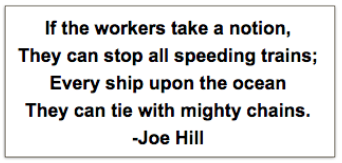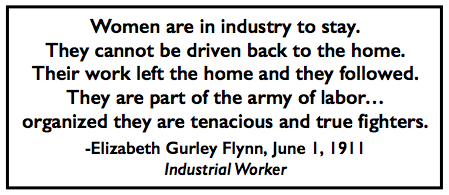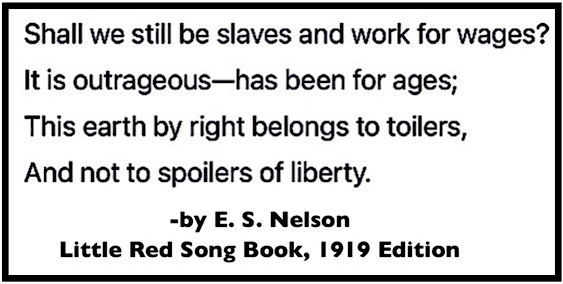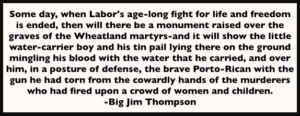 —————
—————
Hellraisers Journal – Sunday January 25, 1914
Salt Lake City, Utah – Joe Hill’s “Crime Record” Received from California
From the Deseret Evening News of January 24, 1914:
 —————
—————
Hellraisers Journal – Sunday January 25, 1914
Salt Lake City, Utah – Joe Hill’s “Crime Record” Received from California
From the Deseret Evening News of January 24, 1914:
 —————
—————
Hellraisers Journal – Sunday January 18, 1914
Salt Lake City – Police Search for Applequist in Connection with Morrison Murders
From the Deseret Evening News of January 15, 1914:
—–
—–
...A gunshot wound in the right hand of Hillstrom, which puzzled deputy sheriffs and police yesterday was explained by Chief Fred Peters of Murray, who said that he “took a shot” at Hillstrom when he leaped from his bed yesterday morning and reached under his pillow. The wound was not a deep or serious one.
—————
[Emphasis added.]
 —————
—————
Hellraisers Journal – Wednesday November 5, 1913
Paterson, New Jersey – Young Weaver Tells of Conditions in Silk Mill
From The Masses of November 1913:
 —————
—————
Hellraisers Journal – Sunday November 2, 1913
Cover Art by Arthur Machia: “The Blanket Stiff”
From the International Socialist Review of November 1913:
 —————
—————
Hellraisers Journal – Monday October 27, 1913
“Jungles” by Agnes Thecla Fair, Girl Tramp, Author of Sour Dough’s Bible
From Miners’ Magazine of October 23, 1913:
 —————
—————
Hellraisers Journal – Thursday October 16, 1913
Chicago, Illinois – Vincent St. John Speaks on Behalf of Wheatland Hop Pickers
From Solidarity of October 11, 1913:
 —————
—————
Hellraisers Journal – Saturday October 4, 1913
Wheatland, California – Hop Pickers Attacked While Meeting on Durst Brothers
From the International Socialist Review of October 1913:
—–
[Part II of II.]
While the workers were still in meeting [of Sunday afternoon, August 3rd] and while they were singing “Conditions They Are Bad,” eleven armed men, headed by Sheriff Voss, whirled into the hop yard in two automobiles. They leaped to the ground. Among them was Edward Tecumseh Manwell, the district attorney. All these armed men charged the crowd. Voss, the sheriff, rushed to the stand, seized Dick Ford, and said he was under arrest. Ford asked for a warrant. Voss struck him. At the same time he lifted his gun, fired and ordered the crowd to disperse. Just then a woman seized Voss. He clubbed her with his gun. She tripped him and he fell.
By this time all the eleven men were shooting and the shots sounded like a battle. Voss went down. The crowd closed in around him. The woman was on top. A Porto Rican, name unknown, rushed from his tent through the crowd and got the sheriff’s gun. He saw the district attorney, Edward Tecumseh Manwell, ready to shoot into the crowd of workers. The Porto Rican killed Manwell. Already one of the workers, an unidentified English boy, had been killed. The Porto Rican then shot Eugene Reardon, one of the deputy sheriffs, and at almost the same time he dropped dead himself with a load of buckshot in his breast, which tore away the ribs and exposed his lungs. Harry Daken fired the shot. All these incidents took place while William Beck, one of the prisoners held in Marysville jail, was running less than two hundred yards.
So dumfounded were the deputies when this Porto Rican boy returned their fire that they ran like scared jack-rabbits. In less than a minute after they charged into the yard they were tearing away again in their automobiles. They made the trip back to Marysville from Wheatland, more than ten miles, in eleven minutes.
Left in the hands of the strikers was the sheriff, whose leg had been broken in the scuffle. Four dead bodies and about a dozen wounded testified to the savagery of the fight. The strikers nursed the wounds of the sheriff and the others injured, regardless of whether they were friend or enemy. After the battle, working-class humanity asserted itself. The sheriff told the men and women that they were better to him than his own men, who had fled. He was taken in a wagon to the town of Wheatland and turned over to his friends.
 —————
—————
Hellraisers Journal – Friday October 3, 1913
Wheatland, California – Hop Pickers on Durst Brothers Meet and Issue Demands
From the International Socialist Review of October 1913:
—–
[Part I of II.]
ACTING on an invitation by Durst brothers twenty-three hundred men, women and children assembled to pick the Durst Brothers’ hops on their 600-acre ranch near the town of Wheatland, California. The posters and newspaper advertisements described the conditions on the Durst ranch as something ideal. All the workers had to do was to pick a few hops, enjoy a picnic and make plenty of money.
Just prior to August 3 these people assembled at the Durst ranch and found the first thing they had to do was to rent a shack or a tent from agents of the owners at the rate of from 75 cents per week up. The first money they earned was deducted to pay this rent. The rentals charged the pickers were in excess of $480 per week for four acres of ground which the state health inspector has described as a “sun-baked flat.” This in itself was a rather tidy profit for the boss.
It was soon found that Durst Brothers had provided only six single toilets for the twenty-three hundred workers. These apologies for modesty were turned over to the women, who used to stand twenty and thirty deep waiting a turn to use these places, while the whole camp looked on. Later it was found, when the men and women swarmed into the fields to pick the hops, that a cousin of the Durst Brothers had the “lemonade privilege.” In order that this thrifty scion of canny stock should have every opportunity to make an honest penny, Durst Brothers would not permit any water to be hauled into the field, nor would they allow the workers to fill bottles from the water wagons which were used in cultivating the crop. Lemonade was sold to the workers at five cents per glass.
Pay at this hop yard was at the rate of 90 cents per hundred pounds of hops picked with a sliding bonus up to 15 cents, according to the length of time the worker staid on the job. Durst Brothers were particularly urgent that the hops should be absolutely clean of leaves or stems and that only the blooms should be taken. This rigid inspection made the work far slower than in other hop yards.
Conditions were so bad that after one or two days’ work the pickers assembled in meeting and voiced their discontent. They drew up demands for better sanitary conditions, more toilets, that lemons and not acetic acid should be put in the lemonade; that they should have water in the field twice a day, that high pole men be provided to pull down the hops from the poles, and that owing to the strict inspection of the pick that the pay be a flat rate of $1.25 per hundred pounds. This would enable an average worker to earn about $2 per day, out of which he had to pay for his shack and board himself.
These demands were presented to Durst Brothers by a committee. Ralph Durst, testifying before the coroner’s jury, stated that when Dick Ford, the chairman, approached him he “had both his gloves on and that he jocosely slapped Ford across the face.” He then took the demands under consideration. After a time he returned and made evasive promises of remedy of the sanitary conditions, talked a lot about having water in the field and flatly refused to advance the wages. This was on Sunday afternoon, August 3. The workers remained in meeting and were considering the reply of Durst. While they were so assembled Durst telephoned to the nearby town of Marysville for the sheriff and a posse. [to be continued…]
[Emphasis added.]
 —————
—————
Hellraisers journal – Wednesday September 10, 1913
Profiles of Elizabeth Gurley Flynn, Inez Haynes Gillmore, and Caroline Lowe
From The Progressive Woman of September 1913:
—–
—–
 —————
—————
Hellraisers Journal – Sunday August 24, 1913
Marysville, California – Fellow Worker Blackie Ford Taken to Yuba County Jail
From The Marysville Appeal of August 23, 1913: